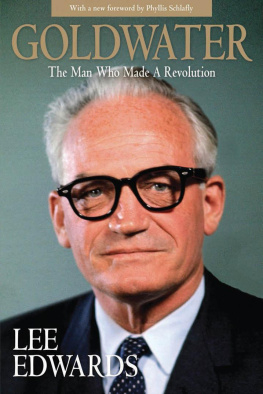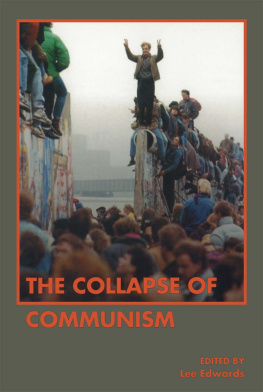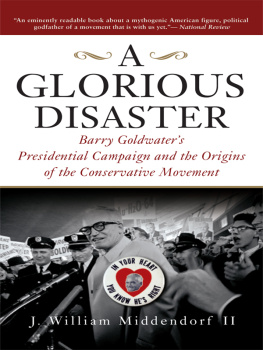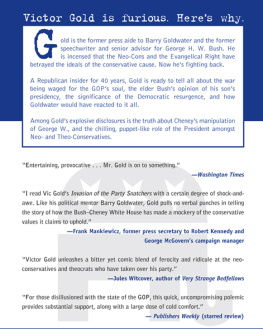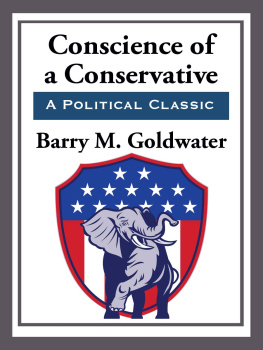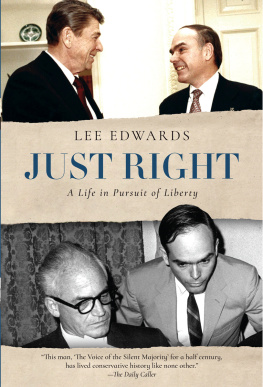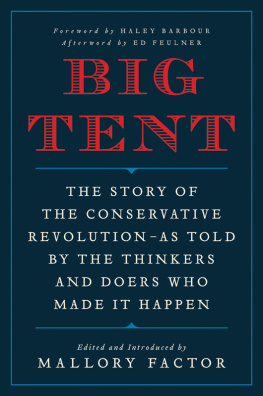GOLDWATER

Copyright 1995 by Lee Edwards
All rights reserved. No part of this publication may be reproduced or transmitted in any form or by any means electronic or mechanical, including photocopy, recording, or any information storage and retrieval system now known or to be invented, without permission in writing from the publisher, except by a reviewer who wishes to quote brief passages in connection with a review written for inclusion in a magazine, newspaper, website, or broadcast.
Regnery History is a trademark of Salem Communications Holding Corporation; Regnery is a registered trademark of Salem Communications Holding Corporation.
First e-book edition 2015; ISBN 978-1-62157-400-2, corresponding with the 2015
Originally published in hardcover, 1995; cataloging information below
First paperback printing 1997;
The Library of Congress cataloged the hardcover edition as follows:
Edwards, Lee.
Goldwater / Lee Edwards.
p. cm.
Includes bibliographical references and index.
1. Goldwater, Barry M. (Barry Morris), 1909 2. LegislatorsUnited StatesBiography. 3. Presidential candidatesUnited StatesBiography. 4. United States. Congress. SenateBiography.
I. Title.
E748.G64E38 1995
973.92092dc20
[B] 95-13283
CIP
Published in the United States by
Regnery History, an imprint of
Regnery Publishing
A Division of Salem Media Group
300 New Jersey Avenue NW
Washington, DC 20001
www.RegneryHistory.com
Manufactured in the United States of America
10 9 8 7 6 5 4 3 2 1
Books are available in quantity for promotional or premium use. For information on discounts and terms, please visit our website: www.Regnery.com.
Distributed to the trade by
Perseus Distribution
250 West 57th Street
New York, NY 10107
For Elizabeth
CONTENTS
BY PHYLLIS SCHLAFLY
I t is unlikely that any nominee for U.S. president who was not elected ever had the lasting influence on American politics that Barry Goldwater did. Indeed, he was more influential than many who were elected. He was the original leader of the modern conservative movement, which has played a dominant and sometimes decisive role since 1964.
Goldwater was authentic. What you saw was what you got. His political positions and agenda came from his personal convictions, not from reading the polls or press releases manufactured by his staff.
Over the years, and even today, many men have hoped they would feel a draft for president. Goldwater is one of the very few men ever really drafted. He did not seek the heavy mantle of leadership. He was drafted by a grassroots movement seeking a leader who would never compromise with the liberals.
Goldwater was refreshingly honest. Bill Clintons first comment on learning of Goldwaters passing summed it up: He was truly an American original. I never knew anybody like him. Perhaps Clinton thinks an honest politician is a curiosity, something fit for display in the Smithsonian.
The importance of Barry Goldwater cannot be overestimated. If there hadnt been a Goldwater, there wouldnt have been a President Ronald Reagan. Thats because the thousands of voters who supported Goldwater at the 1964 Republican National Convention in San Francisco stuck with him despite all the slings and arrows that the Rockefeller Republicans and the so-called kingmakers hurled at him during the campaign. The twenty-seven million who voted for him in November never regretted it because they had become true believers in conservatism.
When Goldwater walked onto the political stage, most politicians claimed the liberal label. Conservative was a sort of epithet that it took political courage to accept. Barry Goldwaters book The Conscience of a Conservative changed all that, making conservative a label we embraced. Goldwater defined the conservative agenda as individual freedom and responsibility, and he plotted the route to get there by reducing the size of government and repealing laws rather than passing new ones.
Those twenty-seven million who withstood the 1964 vitriol against Goldwater kept the faith in the ensuing years and grew into the mighty majority of forty-four million that elected Ronald Reagan in 1980 and the fifty-four million who reelected him in 1984. If there hadnt been a Barry Goldwater, there never would have been a President Ronald Reagan.
By proclaiming from the start that he offered America a choice not an echo, Goldwater made his supporters understand who their political enemies were: the liberal, Eastern Rockefeller Republicans, who every four years from 1936 through 1960 had saddled the Republican Party with a presidential candidate who me-tooed the Democrats on the fundamental issues of big federal spending and a globalist foreign policy.
Lee Edwards is a major historian of the modern conservative movement, and his biography of Barry Goldwater fills a void in the teaching of American history today. It is important for all Americans to know how the grassroots once successfully seized control from the little group of self-appointed kingmakers.
Phyllis Schlafly, the president of Eagle Forum, is the author of twenty-three books, including the bestselling A Choice Not an Echo, originally published in 1964 and updated in 2014.
TO THE 2015 EDITION
I n November 2014, fifty years after Barry Goldwater lost his race for the presidency, several hundred of conservatisms finest met in Washington, D.C., to honor the most consequential loser in twentieth-century politics. Leading the tribute were Phyllis Schlafly, the First Lady of American Conservatism and the author of A Choice Not an Echo, which won the crucial California primary for Goldwater, and J. William Middendorf II, the former secretary of the navy and U.S. ambassador to the Netherlands and the Organization of American States, Wall Street wizard, and adviser to presidents, who served so successfully as treasurer of Goldwaters presidential campaign that he and his colleague Jerry Milbank were dubbed the Fabulous Brinks Brothers.
Eminent conservatives gathered from across the country to reminisce about the 1964 campaign, tell stories that brought laughter and tears, and salute a political leader who would not compromise his beliefs no matter the cost or provocation. Barry Goldwater ignited a conservative revolution, but he was an unlikely revolutionary.
He was a college dropout whose 1960 political manifesto, The Conscience of a Conservative, sold more than 3.5 million copies and was once required reading for History 169b at Harvard. The root difference between the Conservatives and the Liberals of today, he wrote, is that Conservatives take into account the whole man while Liberals tend to look only at the material side of mans nature.
He was a man of contradictions, inspiring and infuriating. He said of his presidential race, I know I am going to lose, but I am going to lose my way, based on principles. He was courageous and cantankerous, announcing, I did not come to Washington to pass laws but to repeal them. He was profane and profound. A classic Goldwater axiom was Any government big enough to give you everything you want is big enough to take away everything you have.
He delighted in saying the unexpected, like the famous line from his acceptance speech, Extremism in the defense of liberty is no vice. He was vilified for saying it, but let us reflect. Was Patrick Henry an extremist because he declared, Give me liberty or give me death? Were the Americans who fought and died in World War II to defeat Nazism and Imperial Japan extremists? Was Christ an extremist because he died on the cross?
Next page
